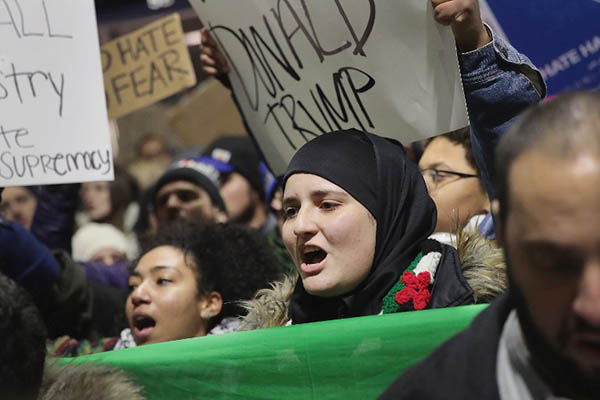
File Photo. Scott Olson-Getty Images North America—AFP
Visitors from countries affected by Trump ban on traveling, immigration left in shock and confusion.
Families split, a father unable to reach his son’s wedding and officials warning of a “gift to extremists”—President Donald Trump’s visa ban on seven Muslim countries has triggered shock and confusion.
“There is mass hysteria among the Iranian-American community—that’s no exaggeration,” said Saam Borhani, an attorney in Los Angeles. He said clients were bombarding him with questions since Trump passed an executive order on Friday, suspending refugee arrivals and imposing tough controls on travelers from Iran, Iraq, Libya, Somalia, Sudan, Syria and Yemen.
With more than one million Iranians living in the United States, the restrictions have already caused chaos for students, businessmen and families.
Borhani, himself an Iranian-American, said he had heard from married couples stuck in separate countries and a father blocked from attending his son’s wedding in California.
U.S. State Department figures show Iran accounted for around a quarter of the 31,804 visas granted to citizens from the seven countries last year. Among thousands facing difficulties, an Iraqi family was barred in Cairo from taking their connecting flight to New York on Saturday.
“I had sold my house, my car, my furniture. I resigned from work and so did my wife. I took my children out of school,” said Fuad Sharef, 51. “Donald Trump destroyed my life. My family’s life. I used to think America was a state of institutions but it’s as though it’s a dictatorship,” he said.
An Iranian woman blocked from boarding at Tehran airport on Sunday said she had waited 14 years for her green card. “Even during the hostage crisis at the U.S. embassy [in 1980], the U.S. government didn’t issue such an order. They say the U.S. is the cradle of liberty. I don’t see freedom in that country,” she said, asking not to be named.
The Iraqi parliament’s foreign affairs committee called for a reciprocal travel ban on Americans, though not the thousands of American military personnel in the country as part of the U.S.-led coalition against the Islamic State group.
A Facebook message from the U.S. embassy in Iraq generated plenty of vitriol. “Daeshi decision,” Baghdad resident Nibal Athed wrote, using the Arabic acronym for I.S. He demanded to know why the list excluded Afghanistan, Pakistan, Qatar and Saudi Arabia, which he described as the “biggest sponsors of terrorism.”
Tehran responded with a ban on Americans entering the country. Iranian Foreign Minister Mohammad Javad Zarif tweeted that Trump’s move “will be recorded in history as a great gift to extremists and their supporters.”
Meanwhile, Yemen’s Houthi rebels, who control the capital Sanaa, released a statement, saying: “All attempts to classify Yemen and its citizens as a probable source for terrorism and extremism is illegal and illegitimate.”
Yemenis made up the largest contingent—12, 998—of immigrants to the U.S. last year from the seven countries, many fleeing the U.S.-backed bombing campaign by Saudi Arabia.
The situation has been complicated by U.S. judges who have questioned the legality of the executive order. “Uncertainty is the key word. Things are changing quickly and we’re trying to keep people updated,” said Borhani, the lawyer in LA.
Getting a visa was already tough for Iranians, who had to travel to Turkey or the United Arab Emirates for the nearest U.S. embassy.
BBC Persian reported that 9,000 Iranian asylum seekers were now blocked in Turkey.
After rising hopes under former president Barack Obama that relations between Iran and the U.S. were improving, Trump has thrown everything back up in the air, Borhani said. “I don’t know what the future is going to hold, whether people here will be cut off permanently from their families in Iran. It’s very stressful.”
Meanwhile, Iran’s leading daily Hamshahri was headlined: “The United States has cut its relations with the Iranian people.” Top reformist paper Shahrvand led with: “Trump’s wall has reached Iran.”
